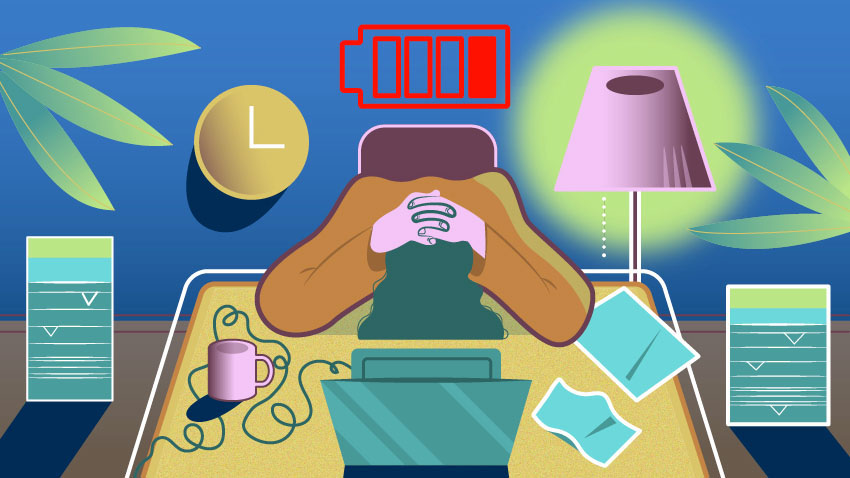
Am I sleep deprived or just plain burned out? Will getting more sleep help me feel less exhausted? Why am I still tired even though I get 8 hours of sleep most nights?
If you’ve ever asked yourself any of these questions, you’re not alone.
In fact, these are some of the questions sleep psychologist and wellness advocate Deidre Conroy, Ph.D., is frequently asked by her patients at the Behavioral Sleep Medicine Clinic in the University of Michigan Health Department of Psychology.
As expected, the answers aren’t black and white, she says.
“That’s because each of us is unique and the circumstances surrounding our sleep quality and overall lifestyle are very different.”
Conroy’s patients are often referred to her after they’ve consulted with a sleep disorder physician at Michigan Medicine. These patients have been tested for conditions such as sleep apnea or other disorders likely to affect sleep, she says.
“If a sleep disorder isn’t diagnosed, I work with patients to identify other underlying causes of their tiredness.”
Conroy shares important information about sleep deprivation versus overall fatigue and burnout, and what you can do to feel more rested.
There’s a difference between feeling sleepy and feeling tired or burned out
“I ask my patients to evaluate themselves,” said Conroy. “Could you fall asleep right now if you had the chance to lie down? Are you having trouble staying alert? These could be signs of inadequate sleep or compromised sleep quality.”
Feeling tired or burned out, on the other hand, may be the result of a range of factors that have nothing to do with inadequate sleep, she says, including, but not limited to:
- Physical activity — either too much or not enough
- Mental health issues such as anxiety, stress or depression
- Certain medications
- Nutritional issues
A person may have slept 8 hours, but still has trouble with wakefulness. For many, the body is fatigued but not sleepy.
“For these patients, the answer isn’t necessarily to get more sleep, but to address the other underlying issues and work on those,” she said.
Your body may be tired but that doesn’t mean you’re able to sleep.
“We call this tired but wired,” said Conroy, noting that the majority of her patients fall into this category.
“These patients find it difficult to turn off their thoughts. Their mind races and they can’t shut it down. They feel exhausted but aren’t able to fall asleep.”
To further complicate matters, said Conroy, many patients are concerned about how their inability to sleep is affecting their health, resulting in even more stress and anxiety.
“The expectations of productivity in our culture are so high and can lead to stress and anxiety,” said Conroy, two key triggers in tired but wired situations.
Conroy sees another example of high expectations in her elderly patients who say they just don’t feel like they did 25 years ago.
“They’re tired and lack energy and may have unrealistic expectations of themselves.” For these individuals, more sleep isn’t always the answer, she says. “I suggest they consider a more tailored lifestyle that doesn’t require as much energy. But this is a delicate conversation. Many times people don’t want to slow down.”
A sleep specialist can help
For those who are curious about whether they need more sleep, Conroy recommends the Epworth Sleepiness Scale as a quick and easy way to evaluate whether you need to get more sleep, improve your sleep practices or seek medical attention.
A visit with a primary care physician is often the first step. During this visit, your doctor can order blood work and test for thyroid issues, anemia and other chronic medical conditions that might be playing a role, she says. “When these are ruled out, individuals may be referred to a sleep specialist.”
As a cognitive-behavioral sleep specialist, Conroy wants to know all facets of her patients’ lives.
“Patients assume they’re not sleeping well but I want to know what else might be contributing to their tiredness.”
She begins by exploring a series of questions:
- What is your sleep schedule? Do you allow yourself adequate sleep?
- What are your lifestyle factors, including nutrition and exercise?
- How is your mental health? Do you experience anxiety or depression?
- What are the stressors in your work and personal life?
Conroy works with her patients to evaluate their issues, then behavioral and cognitive strategies to help combat the things that are keeping them from sleep.
“This might be incorporating relaxation techniques such as deep breathing and guided imagery.”
Sleep quality is always important
Conroy focuses on improving good sleep habits, no matter what a patient’s underlying conditions. This may include setting a regular sleep schedule, avoiding alcohol and caffeine in the evening and minimizing electronics in the bedroom.
There’s hope for better sleep
Conroy acknowledges that it often takes a few steps to achieve good sleep levels and reduce your fatigue. “There are so many things that influence how we feel during the day sleep and it’s different for every person.
“If someone tells me they feel burned out and exhausted all the time, I want to know what’s going on in their life. It could be medical or it could be that they need strategies to help with other issues. It’s very complicated. Often patients want immediate relief, but it takes time.”




